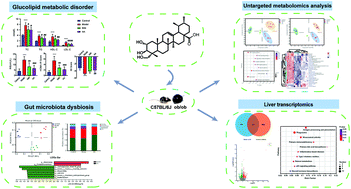Asiatic acid alleviates metabolism disorders in ob/ob mice: mechanistic insights†
Abstract
Glucolipid metabolism disorders pose a serious and global health problem, and more effective prevention and treatment methods are urgently needed. In this study, ob/ob mice were used to explore the potential mechanism explaining how asiatic acid (AA) regulates glucolipid metabolism disorders. Five-week AA treatment (30 mg kg−1) significantly improved a host of metabolic factors in ob/ob mice, including hyperglycemia, hyperlipidemia, insulin resistance, and liver histopathology. Combined analysis of untargeted liver metabolomics, liver transcriptomics, and the gut microbiome was conducted, and the results showed that AA alleviates metabolic disorders in ob/ob mice through regulating pyrimidine metabolism, activating PPAR-γ, and modulating gut microbiota. AA treatment remarkedly increased the levels of cytosine and cytidine, two crucial endogenous metabolites related to pyrimidine metabolism, which were significantly decreased in ob/ob mice. AA treatment also affected the levels of 13-S-hydroxyoctadecadienoic acid, an endogenous PPAR-γ agonist. The abundances of Lachnospiraceae_NK4A136_group and norank_f__norank_o__Clostridia_UCG-014 were increased after AA treatment. Meanwhile, correlation analysis showed that endogenous metabolites and gut microbiota were strongly correlated. These findings indicated that AA supplements might be beneficial for the prevention of metabolic disorders.

- This article is part of the themed collection: Food & Function HOT Articles 2022


 Please wait while we load your content...
Please wait while we load your content...